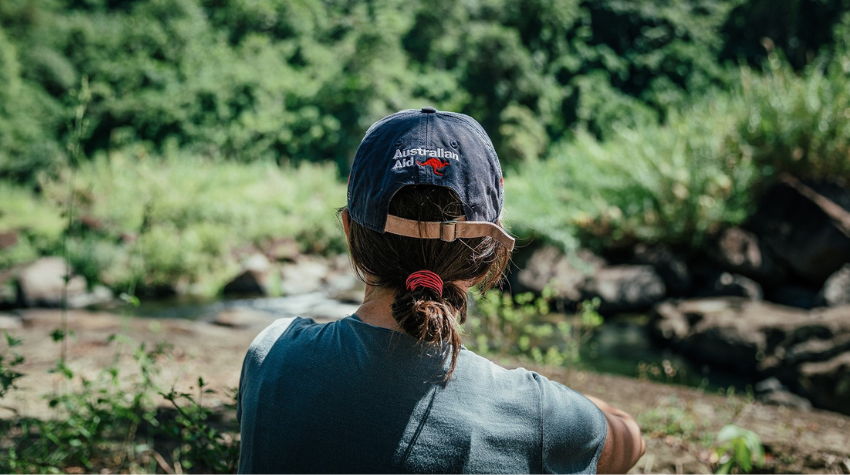The Australia Assists Program is the Australian Government’s humanitarian deployment arm delivering technical expertise around the region and beyond as a part of Australia’s Aid commitment. Georgina’s work in Fiji supporting local communities is evidence of the Australian Government’s continued connection to our Pacific neighbours.
This unique role was specifically requested by the community at an FCOSS event. Meeting a need identified by the community itself has led to a role grounded in the community it serves. Georgina is working with local organisations in the western division of Fiji where cyclones hit most often, and her focus is working with women volunteers at the district and local level.
“My deployment reflects that the Australia Assists Program is dedicated to working at the local level and investing in local leadership”, says Georgina.
From community up
The Fiji Council of Social Services (FCOSS) is a National Platform with a broad grassroots membership base spanning the country. The membership includes and celebrates a diverse range of people and community-based organisations and is mandated to coordinate civil society in times of disaster. It is mainly made up of volunteers, who in disasters are the first responders, providing emergency supplies and also feeding information about what is happening on the ground up to disaster management authorities.
“FCOSS really believes in bottom up rather than top down. FCOSS’ role in the landscape is to give communities a platform to say these are our local solutions, these are things that we already do,” says Georgina. “As FCOSS are the national voice, they're the ones that can hear and act on the issues at the national level.”
Resilient women make communities safer

A significant achievement of Georgina’s deployment so far has been to activate a “Women in DRR in the West” group at the hyperlocal level, connecting members to larger, regional level organisations. “In consultations I have held so far I have ensured a place for women to talk, and this has meant being aware of village gender dynamics and how to navigate them,” says Georgina. This time outside of the cyclone season gives local organisations time to plan, coordinate and reflect on priorities for the season ahead.
Further supporting the role of local women in DRR, Georgina will be rolling out a Safeguarding and PSEA training to all the district groups. The Safeguarding training will reach 230 community-based organisations and 18 District Councils. Georgina has also supported the revision of FCOSS’ Safeguarding Policy to be more user friendly and the one-day training is contextualised to the community level. Offering this training to all of the district groups recognises the frontline role they play when natural hazards hit, and they are mobilised to be first responders. In disasters, groups in society that are already vulnerable become even more so and knowing in advance who these people are being inclusive in our work is critically important.
“Being based in the west is already a positive step to reaching areas that do not usually receive as many opportunities for training and capacity building,” explains Georgina. “The training that I am engaged in will be rolled out at the grass roots of Fijian society. These are the people who are directly impacted by disaster and who will be aware of both their safeguarding responsibilities and the responsibilities of humanitarian actors coming into their villages and towns.”
“Working with communities in the west, it has taken time to gain their trust,” explains Georgina. “Now, the community women are coming into my office and inviting me out to the villages to have a look, to come and see what work I can do and how I can help. I think this reflects a truly community needs-based approach.”
Led by local knowledge
Pacific Islanders and Fijian people have been living with tropical cyclones and extreme weather events for many years. The local communities have solutions to these issues already but may need additional resources to implement them. When DRR is led by local people it is most effective because it strengthens the systems that already exist at the ground level.
“I love this work because I get to meet so many people who are all dedicated to working towards solutions,” says Georgina. “Fijian people are so generous with their knowledge and information and have been very open to collaborating with Australia Assists. The work also feels meaningful because the Pacific is living with the effects of Climate change now and much of the work is very practical.”
The effects of climate change mean that communities face climate-related disasters including rising sea levels, cyclones, floods, and landslides. The impacts of these disasters extend to every aspect of life in Fiji, from livelihoods, to health, to education, to water and sanitation and to culture and connection to the land.
“For Fiji and its people to emerge from the last three years of repeated natural hazards and COVID-19 closures, and to rebuild - for some to start again from scratch or to relocate completely - and to continue to seek to make improvements in Disaster Risk Reduction is the very definition of resilience,” says Georgina. “I've learned about how much knowledge and information people at the community level have about DRR already. The community women that I met the other day in the office, collectively they've probably got 200 years-worth of experiences of cyclones and floods, and living through it, rebuilding.”
“It's been very humbling to work in DRR with a group of people with the community who really are the experts in that area. So, to find the areas where I can add value to what they already know, has been great. I've learned a lot about their local approaches and the way things work on the ground.”


